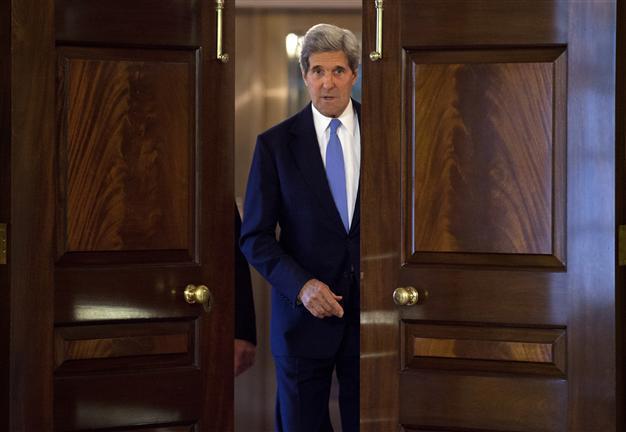Kerry pushes dual peace bids on Middle East return
WASHINGTON - Agence France-Presse

Secretary of State John Kerry. AP Photo
Secretary of State John Kerry was returning to the Middle East Monday, aiming to shore up peace efforts as he seeks to help end the Syria war and coax Israel and the Palestinians back to talks.
The new top US diplomat -- making his fourth visit to Israel in a little over three months -- left Andrews Air Force Base in Maryland, first headed for key Gulf ally Oman, which also maintains close ties to Iran.
The US and other Western countries have condemned Iran for helping to prop up Syrian President Bashar al-Assad in his bloody fight to stay in power against a determined rebellion now in its third year.
Kerry was due to hold talks Tuesday with top Omani officials, most likely including Sultan Qaboos, andh
e could well be hoping to tap Oman's influence with Iran -- especially amid moves to organize a Syria peace conference.
The United States and Russia are working to bring together the Assad regime and the opposition at a conference to map out a path for a political transition to end the war which has claimed over 94,000 lives.
Russia has insisted Iran should be invited to the peace conference, although a date and venue have not yet been agreed. But the West is wary of engaging Tehran in such global efforts.
"We do not want Iran. The Syrian crisis is contagious and affects the entire zone," French foreign ministry spokesman Philippe Lalliot said Friday.
"Regional stability is at stake and we cannot see how a country that threatens this stability can participate in this conference," he said in reference to Iran.
The issue is also likely to be raised at a meeting of the Friends of Syria group in Amman, Jordan on Wednesday, which Kerry will also attend after visiting Oman.
While the beginning of his eight-day trip will likely focus on Syria, Kerry then travels Thursday for talks in Israel and with the Palestinian leadership.
He is seeking to kickstart the peace process, which has languished for more than two years, with a series of parallel moves aimed at restoring trust between the two sides.
One Israeli MP said the center-right government of Prime Minister Benjamin Netanyahu would support US efforts to revive the talks, despite the hardline positions held by ministers and coalition parties.
"If Netanyahu goes on the path that US Secretary of State Kerry is encouraging... he will have the full support of... the majority of the parliament," Ofer Shelah, a member of the powerful Yesh Atid party, told army radio on Monday.
The comments came despite opposition from Yesh Atid's leader, Finance Minister Yair Lapid, in a New York Times interview, to a settlement freeze and to ceding east Jerusalem to Palestinian rule, two key Palestinian demands.
There remains deep skepticism among all sides whether Kerry can break the deadlock and bring the two sides back to negotiations -- let alone whether he can then help broker a peace deal.
"Kerry keeps on saying that he is determined to succeed and will not allow any failure, but he needs to know that the Israeli government is doing anything to prevent him from succeeding in his efforts," Nimir Hammad, a political advisor to Palestinian president Mahmud Abbas, told The Voice of Palestine at the weekend.
With this trip, Kerry, who took office on February 1, will have traveled the same number of times to Israel as his predecessor Hillary Clinton did in her whole four-year tenure.
And it is a measure of the renewed US commitment to the Middle East, that after a brief stop at the weekend in Ethiopia for celebrations to mark the 50th anniversary of the creation of the African Union, Kerry will return to Jordan.
He is to attend a World Economic Forum meeting at which he may outline his plans to revive the crippled Palestinian economy.
